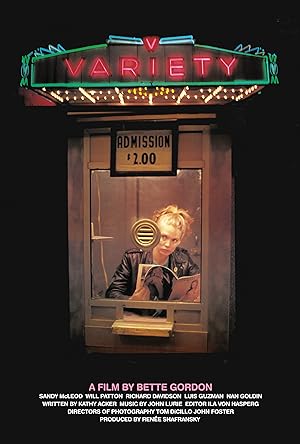The only reason that Variety ended up on my radar is because it was on a list of must see movies by female directors. I saw one movie on that list, Concussion, that had a description that I found less than appealing, but enjoyed so I was wiling to take another chance and see Variety.
Variety is set in NYC in the 80s, predominantly in Times Square when it wasn’t so family friendly (the actual filming location was actually very close to my childhood home, not Times Square, so cue nostalgia). Christine, a young Midwestern writer trying to make ends meet and exasperated by inappropriate sexual advances during job interviews, hears about a job from a female friend that does not think that the job is right for her: a ticket seller at a movie theater that shows pornos and is called Variety! She takes the job. Her boss is nice and played by Luis Guzman. The patrons mostly look at her curiously, but leave her alone except for a shady, but polite businessman who frequents the theater. The only one who reacts negatively to her job is her boyfriend, played by Will Patton, who treats her more like a sounding board and a sugar mama than a romantic interest.
Christine begins to examine what men find so appealing in daily and sexual life, pushes personal boundaries, investigates a particular patron, meditates on what the personal implications would be if she cast herself in the role of the woman in the films that she peddles, traverses areas normally dominated by men seemingly unconcerned about being vulnerable and transforms from a person who has a body and uses it for its created purpose (stretching, swimming, moving) to a screen that she can project different images of femininity on. Occasionally she has nights out with her friends, including a stripper who describes the downside of working in the sex industry by dressing in a more sexualized manner. She listens to her female friends compare and contrast the image of what they imagined romantic relationships would be with men and what they are. As Christine takes this personal journey, she becomes more isolated, outspoken in sometimes positive, provocative or aggressive ways. She abandons her former feminine, complaint and polite way of interacting with men and becomes demanding, dismissive or declaratory. She becomes a walking contradiction: masculine in behavior and feminine in appearance.
For a film that takes place on the sexualized edges of society, there is very little sex except what is briefly depicted in the porn movies and magazines shown from Christine’s perspective throughout Variety. If pornography exists for arousal, and sex exists for at least physical connection, Variety seems to suggest a world where human connection, even for sex, is virtually impossible between men and women. Variety is filled with missed phone calls, social events that end abruptly or when they occur, people seem to be talking past each other. There is no meeting of the minds or the bodies. Variety suggests a solitary frustration that erupts in a brief flash of anger from Christine when she experiences harassment at a porn magazine/peep show spot. A patron, played by Mark Boone Junior, grabs her arm and assumes that she is one of the strippers. He tries to ask her out and won’t take no for an answer, “What is wrong with me?” Christine replies, “Nothing is wrong with you. You’re just acting like a jerk. Get the hell out of my life!” The real Christine is invisible to the men who demand her time and attention, and they render themselves invisible and are incapable of interacting with the reality and not their imagined image of her.
Variety is a film for people who like to meditate on gender roles, but not for people who are looking for an entertaining film. Variety is dated, but probably still provocative enough that viewers sensitive to any sexual content should probably skip it.
Stay In The Know
Join my mailing list to get updates about recent reviews, upcoming speaking engagements, and film news.





